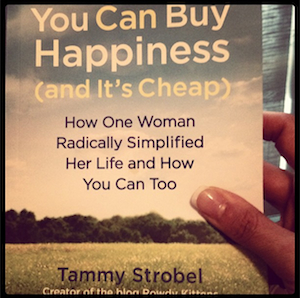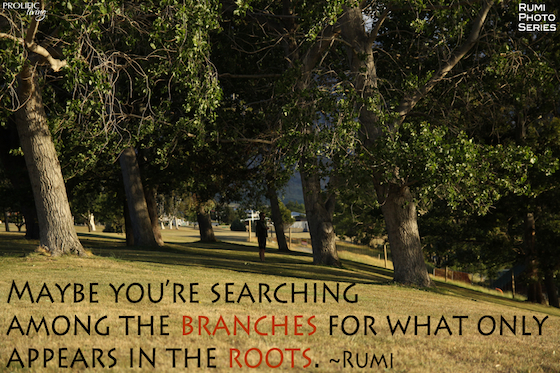“If you want to be happy, be.” ~Tolstoy
Happiness. Oh that elusive, fleeting sensation that we constantly yearn for, wonder about, discuss ad nauseam, search and find only to lose again. In the end, there is one thing we may all be able to agree on when it comes to the state of happiness:
Happiness, or being happy, is always much simpler, purer, and easier in reality than we make it in our complex minds and tired imagination.
The pursuit of happiness through the simpler, purer and easier ways is what pulled me in to Tammy Strobel’s book: “You Can Buy Happiness (and It’s Cheap)”.
The Journey into Minimalism and Tiny Spaces
Tammy shares her personal journey into extreme minimalism in this book. She takes you through the natural ups and downs of this fascinating path, and never makes you feel alone in the process.
She tells stories of adapting to life in her tiny 128 sq. ft. home with her husband and cat, and what can I say, I find that intriguing, even if I love and adore my not-so-tiny space and my not-so-few material things. I appreciate the mindset that it takes to consciously choose to live simply, all the while in a feverish pursuit of happiness in the process.
The book takes you through Tammy’s personal journey from her days at corporate and her dreams of buying a house in the suburbs to giving up most of her worldly possessions on a path to a radically minimalistic life.
The time and effort and energy that she found as a result, she put toward the more important things to her in life, such as volunteering projects, relationships and friendships, writing, and just being present. The extent of her research into happiness and money is evident, and comes through in the form of case studies, casual interviews, and statistics in her book.
Her tone is fun and conversational. She shares her fears and her struggles as openly as her joys and her ever-evolving view into what really makes us human beings happy and the differences she discovers between what’s for real and what’s for show. When Tammy talked about how the things you own may start owning you, she had me hooked, because of that, nobody wishes to be guilty.
My biggest curiosity was to learn how two people can get along so well in a mere 128 sq. ft space and still stay happily married!
The journey into tiny spaces is fascinating, the details are entertaining and educational, and the process is gradual as the couple downsizes from the larger apartment to subsequently smaller ones, and finds more happiness every time they move into a smaller space.
Still, I appreciated that Tammy doesn’t paint a pie-in-the-sky all-is-rosy picture. Even in the downsizing and minimalist route, there are challenges, and it’s not as easy for anyone to give up a car or a closet of clothes or other tangibles. I found her acts very courageous, even if in the end, they brought her more happiness, it is important not to overlook the courage it takes to give up the attachments in the first place in order to gain that extra happiness.
And this journey does have a happy ending – sorry for the spoiler here. Tammy and her husband are content in their tiny space and simple living; this tiny home of 128 sq.ft. brings them immense joy and happiness.
Top 3 Awesome Parts about You Can Buy Happiness
1. Inspiring you to action and to ask hard questions about your “stuff”:
Tammy moved me to action with her words. I was sitting at the dining room table, flipping through the pages of the book, and then promptly walking through closets examining my stuff. Cleaning out our stuff is a repeatable process and every time, you refine, you get better, you change and evolve. So once again, Project GoClean&Lean is well underway in the Brock Household, thanks to Tammy!
2. Sharing her beliefs about happiness without imposing:
Tammy doesn’t push her philosophy of minimalism onto her readers, nor does she advocate her conclusions about the role money plays in one’s happiness as an absolute. And she does this despite her passion around minimalism. I felt at ease because Tammy and I define happiness and the role of money in said happiness differently, but I was deeply interested to learn what I could from her.
3. Watching how she worked out marital disagreements in 128 sq.ft.:
I appreciated so much that Tammy included her arguments and disagreements with her husband, Logan. Few are willing to share the details of their personal arguments and admit to the fights that can take place when something so astronomical is changing in a couple’s life. Thank you Tammy for not just sharing those moments but also admitting to her own vulnerability and then showing us how they patched things up. That was courageous to share.
A Few Thoughts on Money and Happiness
Tammy shares a lot of thought around the role of money in happiness, and I enjoyed reading them as I am sure you would too.
In my life, I have found that money is best when it is a servant, not a master. So I never allowed myself to go into debt or mismanage my finances, partly because I grew up determined to live a comfortable life, and partly because immigrating to Turkey and then to America at a young age, watching my parents lose everything, having an ugly brush with poverty here and there, has made me incredibly vigilant about leading that comfortable life.
I love affording the life I live and I love luxury but I am also intentional about my “stuff”. Everything in my house is there with a purpose and a story and it is the stories behind my things that gives them a special meaning and with that I would not wish to part.
Now, the million dollar question is whether these things I love and cherish make me happy?
The short answer is that I do not think so. I am very happy traveling extremely lights for weeks at a time and leaving all my stuff behind. I am also happy in the lap of luxury. My happiness is not a function of my stuff, but it doesn’t make me want my stuff any less. You know?
I do not believe money in and of itself brings or “buys” you happiness. It is what you do with your money which is a reflection of your value system, that is what defines your core happiness. We forget the direct relationship that money has to those things that we value that we can then afford to do.
So yes to money generating happiness but indirectly. A pile of cash is just paper, who cares about that? But what if you put that pile of cash toward something that is near and dear to your heart? Then will you not be happier? And if so, what all contributed to that happiness?
Money doesn’t just buy the fancy car, the big house, or your kid’s college education. Money also enables you to have a life that you love, it enables you to go places, it enables you to do the things that you crave, and it puts a roof over your head, food in your mouth and a warm bed to sleep on. It takes money to enable all of that. Without money, you cannot survive in a civilized world.
Money can and does heal financial misery and struggle, neither of which is fun, replacing them with heaps of comfort and security. Comfort and security provide you a less stressful life, but it takes a conscious effort not to get wrapped up in the minutia of life and thus be more stressed about little nothings and Tammy speaks to this at length.
I think if it would be naive to flat out say money doesn’t bring happiness – a synonym for comfort, security, absence of struggle and pain. How will you know unless you have truly lived and struggled without enough money for survival? If you have not tasted that state of affairs, you just cannot know.
How can you know what it’s like not to have when you have always had? No imagination can do this justice, methinks.
In the end, if you are an inherently unhappy person, neither a minimalist life nor an extravagant one will make you happy because happiness stems from within. It comes from knowing yourself. Being happy is about falling in love with what is, not what could be or should be.
That much is always in your control, and money does not play a part in that.
I agree with Tammy, and would even take her message one step further: Not only is happiness cheap, it can also be entirely free. Happiness is being present in living life on your own terms, all of which Tammy beautifully articulates in her book. I would read the book over again if only for her entertaining tone, her story-telling abilities, and her search for happiness and simple living through the journey into minimalism and tiny spaces.
Win A Copy of “You Can Buy Happiness”?
 I like to keep my books, and this was a good one, but in the spirit of sharing this message and passing on something that helped me, I’d like to give my copy of this book to you. How you can qualify to win it: By leaving a comment below with your thoughts on happiness or being happy in life and letting me know that you would indeed like to read this book. I will select a random winner by September 30th so hurry and don’t wait.
I like to keep my books, and this was a good one, but in the spirit of sharing this message and passing on something that helped me, I’d like to give my copy of this book to you. How you can qualify to win it: By leaving a comment below with your thoughts on happiness or being happy in life and letting me know that you would indeed like to read this book. I will select a random winner by September 30th so hurry and don’t wait.

 I am Farnoosh, the founder of Prolific Living. So glad you are here. My mission is to empower you to unblock your creative genius to live your dream life.
I am Farnoosh, the founder of Prolific Living. So glad you are here. My mission is to empower you to unblock your creative genius to live your dream life.